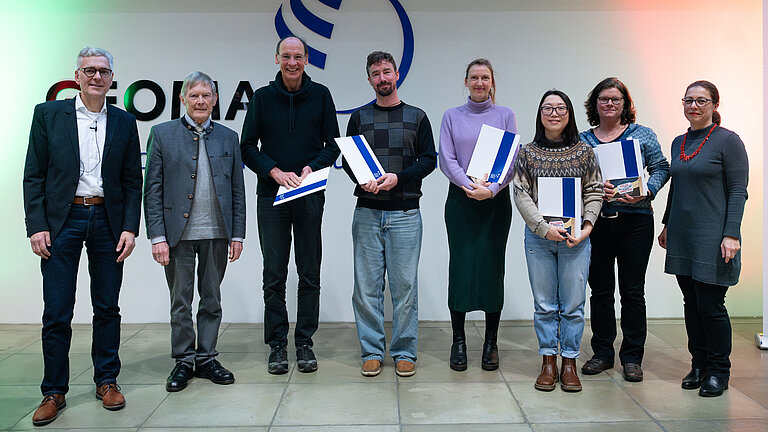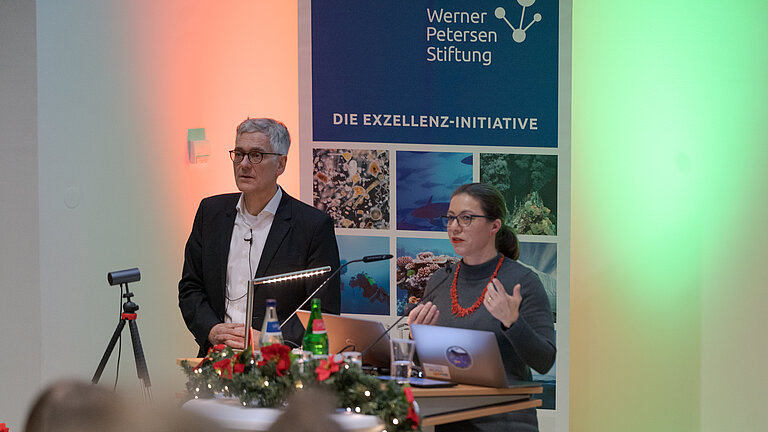Outstanding Achievements of Young Researchers Honoured
Prof. Dr. Werner-Petersen Foundation Awards Prizes for Excellent Doctoral Theses and Outstanding Engagement in Knowledge Transfer, as well as Exchange Scholarships
The Prof. Dr Werner-Petersen Foundation supports excellent scientific work and outstanding commitment to research transfer at the GEOMAR Helmholtz Centre for Ocean Research Kiel. This year’s awardees come from the fields of seafloor dynamics, marine biogeochemistry, and ocean circulation and climate dynamics. Each award is endowed with 2,500 euros.
“The Prof. Dr Werner-Petersen Foundation is an indispensable partner in supporting the next generation of scientists. These prizes recognise not only outstanding scientific work, but also the dedication to research transfer and international collaboration. We warmly congratulate the awardees on their success and thank the Foundation for its continued support,” said Professor Dr Katja Matthes, Director of GEOMAR.
Dr Christian Zöllner, Managing Director and Deputy Chairman of the Prof. Dr Werner-Petersen Foundation, emphasised: “The work we have honoured impressively demonstrates how fundamental research and innovative approaches can contribute to solving global challenges. We are proud to support young researchers whose findings advance science and provide insights into the protection and understanding of the ocean.”
The Awardees and Their Work at a Glance
Petersen Doctoral Prizes
- Dr Mareike Körner: “Physical drivers of seasonal variability in the tropical Angolan upwelling system”
Nominated by Prof. Dr. Peter Brandt (FB1):
Mareike Körner investigates the seasonal variability of nutrient supply and its impact on productivity in the tropical upwelling region off the coast of Angola. She is a physical oceanographer specialising in the collection and analysis of data from research expeditions. A focus of her work has been the analysis of mixing data, which has led to a new explanation for plankton blooms off Angola. In this region, wind does not play a driving role in the upwelling. Instead, nutrients are transported to the surface by the interaction of equatorially driven waves and tidal mixing on the shelf. With her work, Mareike Körner has laid the groundwork for predicting the timing and intensity of seasonal plankton blooms off Angola. After completing her PhD, she moved to Oregon State University, USA.
- Dr Theresa Barthelmeß: “Influence of small-scale dissolved and particulate carbohydrate and amino acid dynamics in the surface ocean on air-sea exchange processes”
Nominated by Prof. Dr. Anja Engel (FB2):
Theresa Barthelmeß’s doctoral thesis investigates how biogeochemical processes in the thin surface layer of the ocean (the “sea surface microlayer”) influence the exchange of gases and particles between the ocean and the atmosphere. She discovered that the biomolecular composition of the surface layer varies with time of day and season, affecting gas exchange rates. By resolving the biogeochemical composition of the surface ocean on a small scale, new insights and explanations have been gained for global, climate-relevant phenomena such as gas exchange and aerosol formation.
- Dr Michael Fuhr (FB2): “Experimental assessment of enhanced benthic weathering of calcite and dunite in the south-western Baltic Sea”
Nominated by Prof. Dr. Klaus Wallmann (FB2):
Michael Fuhr’s doctoral work explored the potential of “Enhanced Benthic Weathering” (EBW) – a process of accelerated rock weathering on the seafloor – as a strategy to remove large amounts of CO2 from the atmosphere. By spreading lime on the seafloor, CO2 can be converted into climate-neutral bicarbonate. His work involved experiments with Baltic Sea sediments, modelling, and an economic assessment of this method.
- Dr Michel Kühn (FB4): “Volcanic arc island flank collapse emplacement: The complex interplay of depositional processes and long-term deposit stability”
Nominated by Prof. Dr. Christian Berndt (FB4):
Michel Kühn’s thesis investigated the geological processes that control the stability of submarine volcanoes. By integrating three-dimensional seismic data and borehole measurements, he was able to show that volcanic landslides destabilise the flanks of oceanic islands for millennia, thereby determining where future landslides are likely to occur. This has important implications for assessing natural hazards such as tsunamis and volcanic eruptions, and explains why some underwater slopes collapse repeatedly in the same areas while others remain stable.
Petersen Knowledge Transfer Prize
- Dr Séverine Furst (FB4):
Nominated by Prof. Dr Morelia Urlaub (FB4):
Séverine Furst receives the Petersen Knowledge Transfer Prize for her outstanding commitment to knowledge transfer and her interdisciplinary work. As a postdoc at GEOMAR, she conducts research on predicting the location and timing of volcanic eruptions using numerical models that simulate rock fracture and magma flow. During a research stay in Indonesia in 2024, she worked with local researchers to integrate her models into early warning systems, demonstrating remarkable adaptability and commitment.
As the leader of the EngageCom project WAVES (underWater geohAzards: Volcanoes, Earthquakes and tSunamis), she developed a 3D model of a volcano to help make geoscientific processes more understandable, for example, at public events and through the “Rent-a-Scientist” programme. She has also been involved at a political level, for example as part of a delegation to the European Parliament, and has developed her science communication skills through the Helmholtz programme “Bridging Spheres”.
Petersen Exchange Scholarship
- Dr Tianfei Xue
Nominated by Prof. Dr Andreas Oschlies (FB2):
Dr Tianfei Xue will spend a research period at the University of Bern in Switzerland. The exchange will involve collaboration with the Climate and Environmental Physics group on modelling planktonic ecosystems in the Arctic. Following her successful modelling work on plankton dynamics in the upwelling region off Peru and in the Southern Ocean, this will extend her scientific portfolio to a new region strongly affected by climate change. The collaboration will also focus on modelling the vertical migration of zooplankton. The scientific knowledge and expertise gained from this collaboration will also strengthen her DFG proposal, which aims to investigate the biogeochemical effects of vertical migration patterns of zooplankton and their potential shifts due to climate change.

Six young scientists received this year's Prof. Dr Werner Petersen Foundation Early Career Awards. At the ceremony: Frank Spiekermann, Dr Christian Zöllner, Prof. Peter Brandt (for Dr Mareike Körner), Dr Michael Fuhr, Dr Theresa Barthelmeß, Dr Tianfei Xue, Prof. Heidrun Kopp (for Dr Michel Kühn and Dr Séverine Furst), Prof. Katja Matthes (from left). Photo: Lukas Schröder

Congratulations to the award winners and thanks to the Prof. Dr Werner Petersen Foundation: Frank Spiekermann, Administrative Director and Professor Dr Katja Matthes, Director of GEOMAR. Photo: Lukas Schröder


